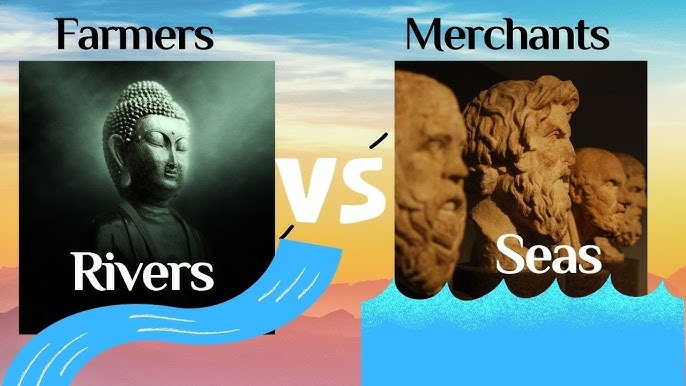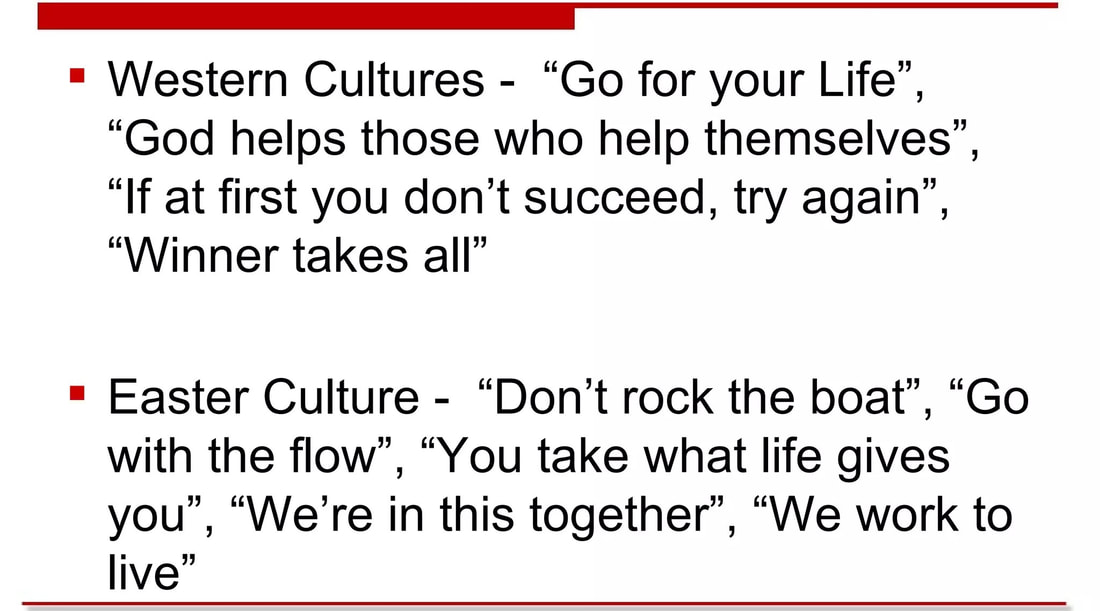|
I found those two images online and they seemed to offer up some stereotypes associated with each culture. Here is my overly simplistic working hypothesis:
Every religion is a cultural answer to that social condition. This does seem to offer insights into the difference between the East and the West. Western civilizations have a focus on the individual self, while Eastern civilizations have a renouncing of the individual self. The West focuses on changing conditions within this life, whereas the East looks to escape through death from this unchanging life situation. Why is that? Western civilization is a confluence from two sources: Ancient Greece and the Hebrews. Both cultures were small in population, so everyone counted, and everyone mattered. The ancient Hebrews started out as merely one tribal and then a cluster of tribes, and finally to a small kingdom surrounded by numerically more populous, potentially dangerous kingdoms. Even as the tribe of the Hebrews became the kingdoms of Judah and Israel, the organizing religion and social attitudes were the Hebrew tribal recognition that every person counted and was counted. In the mythological records of the Hebrews, it seems that every birth, at least of the male children—it was a patriarchal and sexist society, was mentioned, and their individual names mattered to who they were. Individuals matter, and the hope for a better life in this world was being held out to the Hebrew people. For the Greeks, their 'bible' that defined who they were and what they were supposed to be was the gift of the Muses—the voice of the God's insights—to Homer in his tales of the Iliad and the Odyssey. In both, the narrative focuses on distinct individuals. The Iliad gives the illusion that everyone who took place in that battle and siege was named. The Odyssey is the tale of one man trying to save himself and a select group of other individuals vs. a select group of other named men who wish to steal his home, his socio-political status, and his wife. The ancient Greeks celebrate contests so that individuals will triumph and be remembered. It is any wonder that with those two sources for Western Civilization to draw upon, the philosophic and cultural focus will be on the importance of actualizing the individuals' desires, dreams, and aspirations for success in this life. Whereas in the Eastern civilizations of China and India, things were much different. Both were large land masses with enormous populations. Both had rigid hierarchical social structures that you were born into, which determined your status and fate. Poverty and, thus, suffering were the gift to the masses from fate. Religion became the answer to that suffering. Within India, the religious answer was to know your place, accept your fate, and be rewarded not in this life but in the next. Escape in what comes after death to a better fate, perhaps even oblivion. The answer is the denial of the self to find the selfless connection to the divine. Which makes perfect sense when the vast majority are stuck in misery. With the advent of Buddhism, this focus does not change but is merely recognized as 'Noble Truths'. Escape from this life is still being held out as the prize and the solution. Renounce the self, renounce the ego, and by that means of selflessness lies your eventual salvation from suffering. In China, you have a Confucian social and political philosophy that focuses on knowing your place, your fated social status, and obeying authority. With the advent of Legalism added to the doctrines of Confucius, you have the social-political answer to not bother with the 'carrot' but just use the big stick and wield it often enough to keep the masses in line. For both India and China, the religious/philosophic doctrines served the status quo and those who were in power. Social change was an evil that their respective religions and philosophies kept in check by its focus on selflessness, fate, and the idea that the status quo would never change. Christianity in the West is the fusion of the Roman Empire and the Hebrew Kingdoms, and Rome came out on top. Again, the clarion call to know your place and accept that position was strong. However, Rome had the Greek idea that an individual's merit could raise their social status. But the Church of Christianity wielded power with the threat of eternal damnation, and the only salvation was by the divine intervention of the Church to save you. Save you NOT in this place but through the escape of the afterlife. Thus, again, an ideology that tried to control the social status quo of its empire. As for Islam, it is submission to God, to the powers that speak for God. With the hope that you will be saved by that submission through the escape to the afterlife. Thus, it is more an 'Eastern' religion than a Hebraic Western one. In summation the Western attitudes of the Hebrew/Greek focus on the individual and the importance of the individual's realizing success and satisfaction in this world would seem to disrupt the Eastern cultures' and religions' hold on the social/political status quo of distribution of power. As I said, I have simplified things, but I believe I pointed out essential themes that hold true.
0 Comments
|
Gary Jaron's musings.
In my High School Art Department someone had made an ornate sign on hung it on the wall that read: 'Ignore this sign completely.' A paradox couched in sarcasm and irony. This blog is for random musings on anything and everything that comes into my head. Archives
June 2024
Categories |


 RSS Feed
RSS Feed